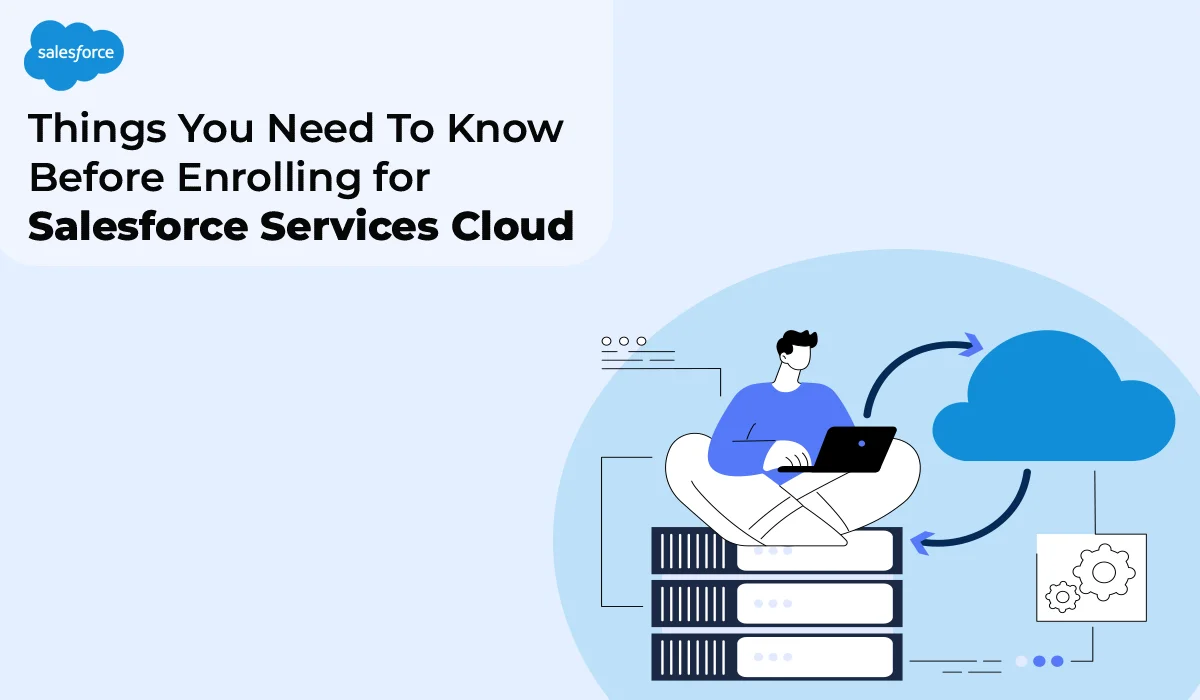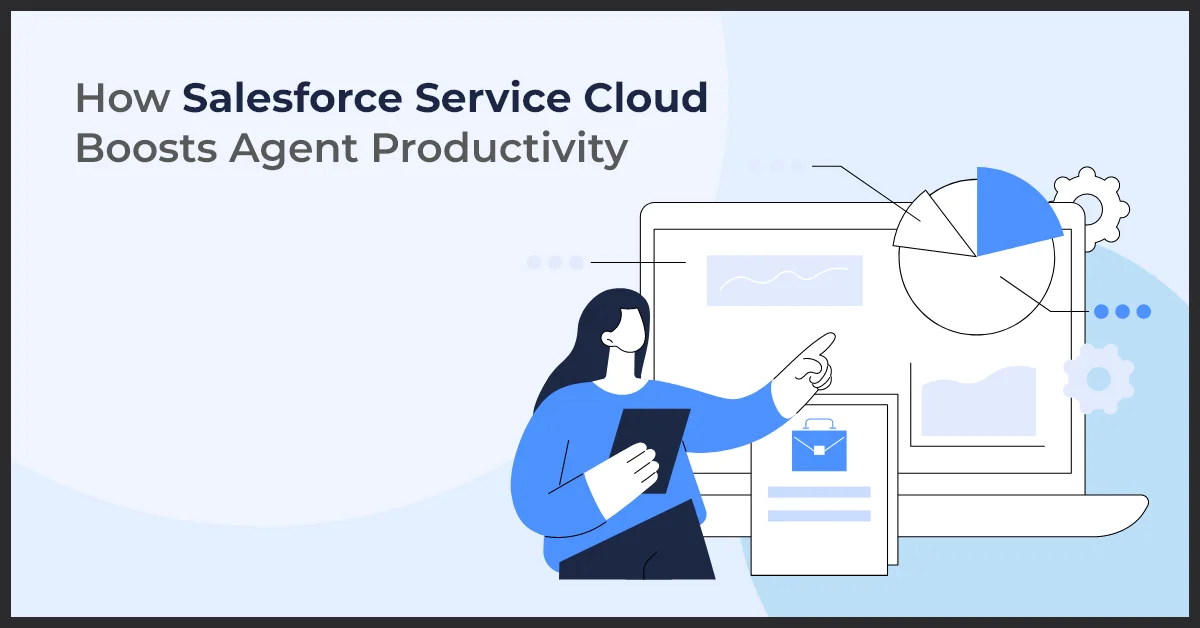Decoding Salesforce Service Cloud: A Prologue to Seamless Adoption

Published on: March 9, 2022
Updated on: July 09, 2024
770 Views
- Service Cloud
10 min read
So, you've got your eyes set on conquering the Salesforce Service Cloud realm—good call! This robust platform is a game-changer when it comes to delivering top-notch customer service. And choosing Salesforce Service Cloud is a step in the right direction for revolutionizing your customer service game.
But before you dive headfirst into the Salesforce Service Cloud universe, take a moment to reflect on your organization's unique customer service requirements. Whether it's streamlined case management, efficient agent collaboration, or powerful analytics, having a clear understanding of your needs will guide your journey through Service Cloud customization.
The implementation of Salesforce Service Cloud holds immense potential for transforming customer service and support operations, but without a comprehensive understanding of the platform and careful planning, businesses may encounter various challenges.
Let's navigate the complexities of Salesforce Service Cloud adoption so that you can ensure a successful implementation that truly enhances customer service capabilities and contributes to overall business success. Shall we?
Understanding Salesforce Service Cloud: A Sneak Peek into Customer Service Awesomeness
First things first, what in the cloud is Service Cloud? Well, it's Salesforce's superhero suite for turbocharging your customer service game. At its core, Service Cloud is all about giving you the tools to provide stellar customer support. It's not just a helpdesk, it's a dynamic hub where customer queries transform into opportunities for jaw-dropping service.
Service Cloud's case management organizes and prioritizes customer cases, ensuring nothing slips through the cracks. From inquiries to resolutions, it's the smooth operator of Service Cloud functionalities.
Furthermore, its knowledge base is your digital encyclopedia, storing solutions to common issues, FAQs, and troubleshooting guides. With this knowledge hub, you'll be resolving customer queries at superhero speed.
The cherry on the top is its omnichannel support that lets you meet your customers where there. Service Cloud lets you connect with customers across various channels seamlessly. Whether it's email, social media, or the good ol' phone, Service Cloud ensures a consistent and delightful customer experience.
Navigating the Customer Service Landscape: Assessing Your Business Needs
Before you dive into the tech wonderland that is Salesforce Service Cloud, let's take a stroll down the path of assessing your business needs. Here's what you’d need to do:
- Conduct a Thorough Analysis of Your Customer Service Requirements: To turn every customer service woe into a superhero rescue, you need to conduct a thorough analysis of your customer service requirements. What kind of support do your customers crave? Are they looking for lightning-fast responses, or do they prefer a detailed, thoughtful approach? Dig into the nitty-gritty of your customer interactions to uncover the gems that will shape your Service Cloud journey.
- Identify Pain Points and Challenges in the Existing Support Processes: Every business has its quirks, and customer support is no exception. Take a good, hard look at your existing support processes. Where are the bottlenecks? What recurring issues make your support team break into a cold sweat? Service Cloud isn't just a band-aid or a hot-fix for these pain points, it's the remedy that addresses these challenges head-on, making your customer support process as smooth as a perfectly brewed cup of coffee.
- Understand How Service Cloud Aligns with Specific Business Goals and Objectives: Your business isn't just running on autopilot, there are goals and objectives steering the ship. So, how does Service Cloud fit into this grand scheme? Whether it's streamlining processes, boosting customer satisfaction, or scaling your support efforts, Service Cloud brings the tools to turn those objectives into tangible victories.
Why is Integrating Service Cloud with Sales and Marketing Clouds a Game-Changer?
Now, let's talk about collaboration. Integrating Salesforce Service Cloud with Sales Cloud and Marketing Cloud is a super smart choice. It's not just about playing nice, it's about creating a powerhouse trio that can elevate your business to unprecedented heights. Here's why.
- A 360-Degree Customer View: Integrating Service Cloud with Sales and Marketing Clouds provides a panoramic view of your customers. From the initial marketing touchpoints to sales interactions and ongoing service engagements, it's a comprehensive saga that helps you understand your customers like never before.
- Effortless Lead-to-Customer Journey: Ever felt like your leads are lost in translation between marketing and sales? Integration erases those lost-in-limbo moments. With a synchronized flow of information, leads smoothly transition from marketing efforts to sales conversations and, eventually, to Service Cloud for impeccable post-sale support. It's the lead-to-customer journey on autopilot.
- Streamlined Communication: Integration ensures that your sales reps are in the loop about ongoing service interactions, and your support team is aware of the latest sales nuances. It's like a roundtable discussion where everyone has a seat, ensuring your team operates with synchronized precision.
Understanding the Seamless Flow of Information Between Different Salesforce Clouds
When these clouds harmonize, the result is pure business magic. But here's how the information flows seamlessly between these clouds.
- Data Synchronization: Salesforce's integration prowess ensures that data dances effortlessly between Service Cloud, Sales Cloud, and Marketing Cloud. Whether it's customer information, lead details, or service requests, everything stays in sync.
- Automated Workflows: Integration isn't just about data, it's about automating workflows. When a lead converts to a customer, Service Cloud can automatically kick in with post-sale support processes. It's the beauty of a hands-free operation where manual handovers become relics of the past.
Smooth Sailing into Service Cloud: Navigating Data Migration Considerations with Finesse
When we talk about Salesforce Service Cloud adoption, we can't not talk about data migration considerations. Because, let's face it, a ship is only as good as its crew, and in the world of customer service, data is your captain. Before you start the migration engine, take a moment to:
- Define Objectives: Clearly outline what you aim to achieve with data migration. Are you looking to streamline customer profiles, enhance reporting capabilities, or perhaps all of the above? Knowing your desired outcome ensures a smoother journey.
- Map Data Sources: Identify the sources of your existing customer data. It could be spreadsheets, legacy systems, or another CRM platform. Understanding where your data resides is the first step in successfully bringing it aboard the Service Cloud ship.
- Consider Data Structure: Service Cloud has its own way of organizing data, so assess how your existing data aligns with Service Cloud's structure. This evaluation helps in crafting a migration plan that ensures a seamless fit.
- Consider Data Structure: Service Cloud has its own way of organizing data, so assess how your existing data aligns with Service Cloud's structure. This evaluation helps in crafting a migration plan that ensures a seamless fit.
Data Cleansing and Validation Best Practices
Your data is precious. You want to ensure it's filled with gems, not clutter. Before migration, adopt these best practices:
- Cleanse Redundancies: Identify and eliminate duplicate or obsolete records. This not only reduces clutter but also ensures that your Service Cloud voyage starts with a pristine data landscape.
- Standardize Formats: Harmonize data formats across fields. Consistent formatting minimizes errors and ensures that your data speaks the same language throughout its journey.
- Validate Accuracy: Conduct thorough data validation to catch any inaccuracies. This step is like checking your navigation instruments; you want them to be accurate for a smooth sail.
Along with these best practices, ensure that you don't fall prey to common data migration pitfalls like insufficient testing, lack of stakeholder communication, and ignoring data ownership. Thoroughly test your migration plan in a sandbox environment, keep all hands on deck informed, and clearly define data ownership roles.
Tailoring Service Cloud: Unleashing the Power of Customization and Configuration
The next step is to configure and customize Salesforce Service Cloud. Customizing and configuring Service Cloud is not just about making it look good, it's about making it work brilliantly for your business. Here's a quick rundown of the customization options at your fingertips:
- Custom Fields and Objects: Want to track unique customer data that's specific to your business? Custom fields and objects are your go-to tools. From customer preferences to specialized service requests, you can tailor Service Cloud to capture it all.
- Workflow Rules and Automation: Streamline your processes with workflow rules. Set up automated actions based on specific triggers, ensuring that routine tasks are handled with efficiency.
- Page Layouts and Record Types: Make Service Cloud work the way you work. Customize page layouts to display information relevant to specific user profiles, and define record types to categorize data based on your business needs. It's the equivalent of having a personalized workspace for each team.
Considerations for Tailoring Service Cloud to Meet Specific Business Needs
Customization is not a one-and-done affair, it's an ongoing relationship. Consider these factors to tailor Service Cloud to the unique DNA of your business:
- User Feedback Loop: Your service reps are the front line. Keep a feedback loop open to understand their pain points and needs. Customization should align with their workflow, not disrupt it.
- Scalability: Think long-term. As your business grows, so should your Service Cloud setup. Opt for customization options that scale seamlessly, ensuring that your system evolves with your business.
- Integration Strategy: Service Cloud doesn't operate in isolation. Consider how it integrates with other tools and systems within your business ecosystem. A well-integrated setup ensures a cohesive and efficient operation.
Best Practices for Salesforce Service Cloud Configuration to Ensure Scalability and Flexibility
Configuration is the backbone of a well-oiled Service Cloud machine. Here are some best practices to ensure things are running smoothly:
- Start with a Solid Foundation: Lay a strong groundwork. Plan your configuration based on a deep understanding of your business processes and requirements. A solid foundation ensures stability as you build up.
- Document Your Configuration: Treat your configuration like a treasure map. Document every customization and configuration. It not only helps in troubleshooting but also ensures a smoother transition for future updates or new team members.
- Regularly Review and Optimize: Don't let dust settle on your configurations. Regularly review and optimize based on changing business needs. It's like giving your Service Cloud a regular check-up to ensure it's running at peak performance.
5 Pro-Tips for a Phased Salesforce Service Cloud Rollout to Minimize Disruptions
Service Cloud implementation is not just about launching a ship, it's about embarking on a journey towards exceptional customer service. Here are some pro-tips for you to rollout Salesforce Service Cloud:
- Start Small, Dream Big: Begin with a phased approach. Implement Service Cloud in stages, focusing on specific functionalities or user groups. This minimizes the risk of disruptions and actual disruptions and allows you to fine-tune as you go.
- Use Feedback Loops: Create feedback loops with users during each phase. Their insights are like wind in your sails—guiding you to make adjustments and improvements before the full rollout.
- Communicate Effectively: Be the lighthouse in the storm—communicate clearly. Keep your crew (users) informed about upcoming changes, timelines, and support channels. Effective communication fosters trust and reduces resistance.
- Provide Ample Training: Knowledge is the crew's greatest weapon. Offer extensive training during each phase. This not only ensures a smooth transition but also boosts user confidence in navigating the new waters.
- Monitor and Iterate: Keep a weather eye open for potential storms. Monitor system performance and user feedback. Use this data to iterate on your implementation strategy, ensuring continuous improvement.
Wrapping Up
Adopting Salesforce Service Cloud is a step in the right direction for revolutionizing your customer service game. With a bit of upfront knowledge and a willingness to explore, you'll find yourself navigating the Salesforce Service Cloud waters with confidence, providing exceptional service that keeps your customers coming back for more.
Want a Seamless Salesforce Service Cloud Adoption? Let’s Talk!
Our Salesforce-certified experts would love to pitch in. Just write to us at info@growthnatives.com and we’ll take it from there.
